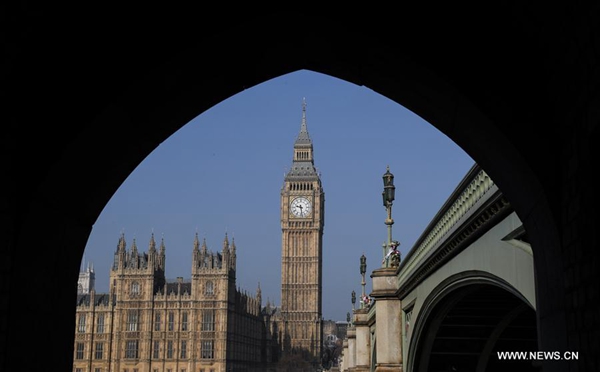UK: After triggering Article 50
china.org.cn / chinagate.cn by Sajjad Malik, March 30, 2017 Adjust font size:
|
|
|
Photo taken on March 28, 2017 shows the Houses of Parliament in London, Britain. Britain will trigger its exit from the European Union on March 29, nine months after the country voted to leave the European Union. (Xinhua/Han Yan) |
The triggering of Article 50 of Lisbon Treaty formally put the United Kingdom on a path to exit the European Union. The start of the complicated process may bring smile to those who last year voted for Brexit. But it would be an arduous journey and by the time U.K. finally leaves the union after negotiations, which are set to complete by 2019, its domestic political and geographical realities might have changed.
As far as the process to trigger the divorce from the EU is concerned, Article 50 provides the mechanism. Para 1 of Article 50 says that any member of the EU may decide to withdraw from the Union in accordance with its own constitutional requirements.
It is actually Paragraph 2 which sets out the procedure, saying that "a Member State which decides to withdraw shall notify the European Council of its intention." After the notification, the Union shall negotiate and conclude an agreement with that state, setting out the arrangements for its withdrawal, taking account of the framework for its future relationship with the Union.
Paragraph 3 gives the timeframe: "The Treaties shall cease to apply to the State in question from the date of entry into force of the withdrawal agreement or, failing that, two years after the notification referred to in paragraph 2, unless the European Council, in agreement with the Member State concerned, unanimously decides to extend this period."
The Treaty also says that if a state which has withdrawn from the Union seeks to rejoin it, then its request will be subject to the procedure mentioned in Article 49.
Prime Minister Theresa May would trigger the separation by writing a formal letter or sending an email to the president of European Council. Detailed official declaration could also be delivered by a senior official of the British government. The president of council will respond in about 48 hours to confirm the notice while PM May will inform the parliament that she has formally initiated the Brexit.
It would take at least another month and half to set out the terms of negotiation and start the talks for completion of the withdrawal. The entire process would be completed by March 29, 2019, two years from the start of notice.
The process is long and could be complicated. It would not be without consequences for the U.K., which stands at the cross roads of its history. The Brexit has already deepened the internal fissures within the country.
Brexit vote was sharply divided among the four constituents of U.K.: England and Wales supported the idea of divorce but Scotland and Northern Ireland rejected it. The Scotts were unhappy at the outcome of the referendum held over the issue of EU membership. Now they are demanding a price in the form of a new referendum for them to decide their political future.
The Scottish parliament also supported First Minister Nicola Sturgeon's bid of referendum a day ahead of triggering of Article 50. The idea is to seek fresh opinion from the people if they still wanted to live with the U.K. after their will to remain as part of EU was rejected.
Sturgeon told the assembly in Edinburgh that the Brexit would have a big impact on trade, investment and life style of the people and the society. She made it clear that once the term of separation of U.K. from EU become clear after negotiations, the people of Scotland should go for vote to decide if they still want to live as before. She has proposed late 2018 or early 2019 for seeking will of the people.
In the previous referendum held in 2014 on the issue of separation, Scotts rejected it by 55 percent in favor of the U.K. while 45 percent against it. But the situation has changed after the Brexit and it will further change during the course of lengthy talks for final separation.
Britain is entering into an uncertain period of its history. Hopefully, it would succeed to safeguard its great traditions and vital interests while embarking on a new journey. Let its quest to regain full sovereignty may also be a voyage for a stronger, prosperous and peaceful United Kingdom.
Sajjad Malik is a columnist with China.org.cn. For more information please visit:
http://www.china.org.cn/opinion/SajjadMalik.htm
Opinion articles reflect the views of their authors, not necessarily those of China.org.cn.
